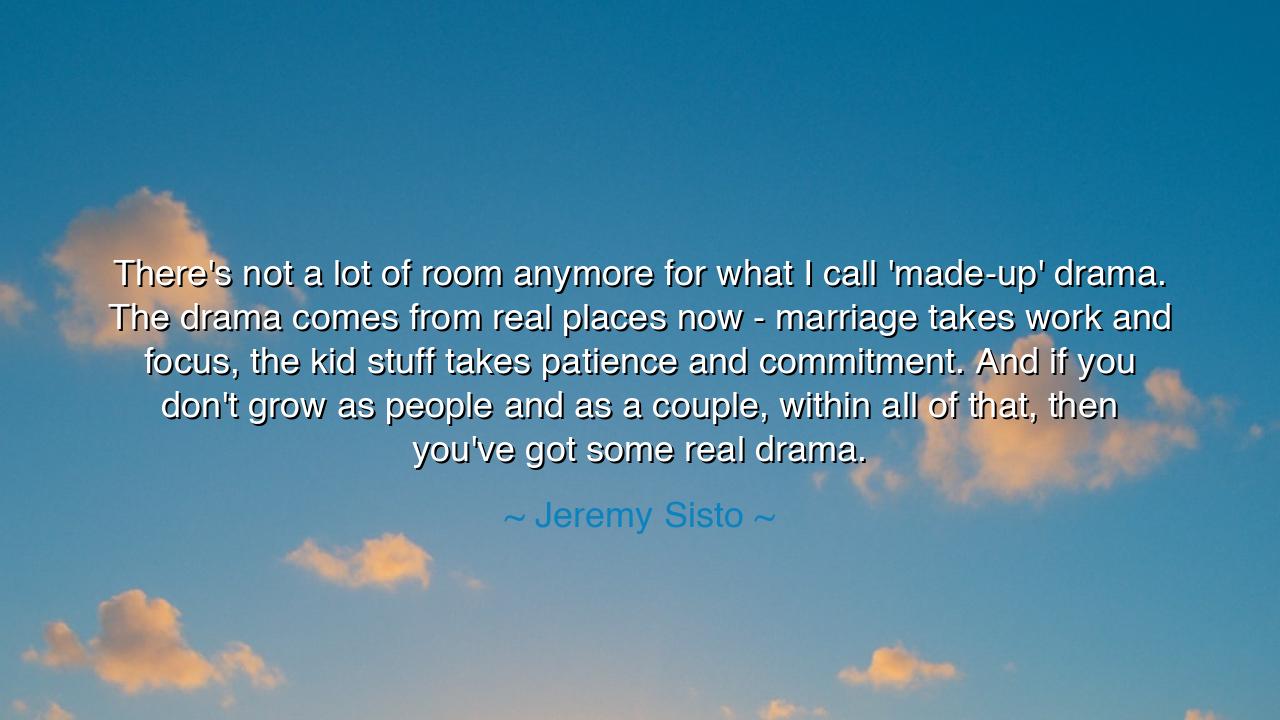
There's not a lot of room anymore for what I call 'made-up'
There's not a lot of room anymore for what I call 'made-up' drama. The drama comes from real places now - marriage takes work and focus, the kid stuff takes patience and commitment. And if you don't grow as people and as a couple, within all of that, then you've got some real drama.






Hear, O sons and daughters of life’s long road, the words of Jeremy Sisto, who spoke not of fiction but of truth: “There’s not a lot of room anymore for what I call ‘made-up’ drama. The drama comes from real places now—marriage takes work and focus, the kid stuff takes patience and commitment. And if you don’t grow as people and as a couple, within all of that, then you’ve got some real drama.” At first, his words seem as the musings of an actor, but they are in fact the confession of a man who has seen that life itself holds deeper trials than any stage. For the play of fiction fades, but the struggles of love, of family, and of growth endure in every heart.
From the beginning of time, humankind has been drawn to stories filled with drama—the tragedies of kings, the quarrels of gods, the betrayals of warriors. Yet those who live in the world soon learn that the greatest struggles are not staged upon theaters, but within the home. To keep a marriage strong, to raise a child with wisdom, requires more endurance than the battlefield and more courage than the throne. This is the origin of Sisto’s words: that the trials of everyday love and family are no less heroic than the epics of the ancients.
Consider, O listeners, the tale of Odysseus. Long did he endure monsters, storms, and battles. Yet when he returned at last to Ithaca, he found his greatest test: to reclaim his home, to prove his constancy, and to reunite with Penelope, whose patience had been as mighty as his sword. His wandering was great, but the true drama of his life lay not in slaying beasts, but in sustaining his marriage and protecting his household. So too does Sisto remind us that the real battles of modern life are fought not on foreign shores, but in the quiet constancy of love, patience, and growth.
For the raising of children is itself a crucible. A child tests the temper of the spirit, waking parents in the night, demanding energy when strength is gone, requiring wisdom when patience is thin. Yet through such trials, the soul is refined. The parent learns to bend, to endure, to sacrifice—and in this sacrifice finds a love deeper than any fleeting pleasure. Here lies true commitment: not the ease of dreams, but the labor of reality.
Sisto warns also of the peril: if within these trials the couple does not grow, if they remain stagnant, then true drama emerges—not the play-acting of fiction, but the pain of love grown cold, of distance unhealed. For life demands growth, and if two walk together yet refuse to change, they will stumble and fall apart. To be united in struggle is to be tested, but to grow together in struggle is to be victorious.
The meaning of these words is profound: that false drama, the kind stirred by vanity or pride, has no place in a life already full of real battles. It is wasteful to invent quarrels when life itself offers enough trial to strengthen the soul. The wise cast away “made-up” drama, and instead focus their energy on the noble work before them—building love, raising children, and enduring together.
The lesson for you, O hearer, is this: embrace the real drama of life, but let it make you stronger. When conflict arises in marriage, see it not as an enemy, but as an invitation to grow. When the burdens of parenthood weigh heavy, see them as the chisels shaping your character. Do not waste your spirit on petty quarrels or vain disputes; instead, save your strength for the great work of love and unity.
Practical steps are clear. Practice daily gratitude for your partner, that you may remember the bond you share. Approach your children not with irritation, but with the patience that teaches by example. When disagreements arise, do not escalate them into false drama—seek instead to listen, to learn, to compromise. And above all, commit to growth, both as individuals and as companions, so that together you may transform trial into triumph.
Therefore, O children of tomorrow, remember Jeremy Sisto’s wisdom: that life offers all the drama one could ever need, and that the true measure of character is not in avoiding it, but in meeting it with focus, patience, commitment, and love. If you do so, you will find that even the fiercest storms of family and marriage will become not a curse, but a testament to the strength of your bond.






AAdministratorAdministrator
Welcome, honored guests. Please leave a comment, we will respond soon